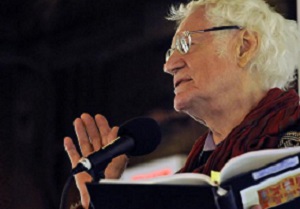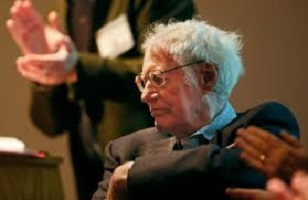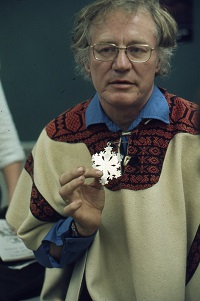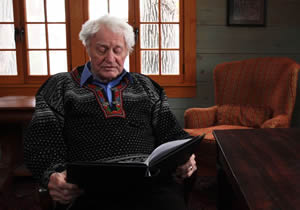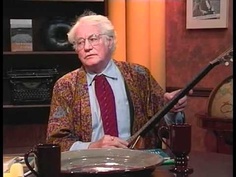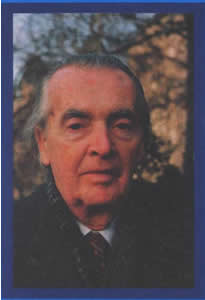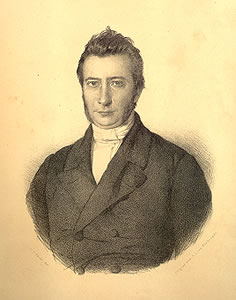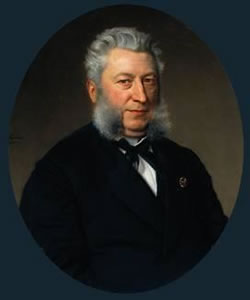De Franse dichter, schrijver en essayist Marcelin Pleynet werd geboren op 23 december 1933 in Lyon. Zie ook alle tags voor Marcelin Pleynet op dit blog.
Uit: Chagall en France
« Chagall arrive pour la première fois à Paris en 1910, il a vingt-trois ans, il n’en repartira qu’en 1914, pour revenir en 1923 et rester en France jusqu’à ce que la guerre l’en chasse, en 1941. Il séjournera alors aux États-Unis, de 1941 à 1948, date à laquelle il s’installe définitivement en France.
Si l’on fait le compte, on constate que Chagall a passé plus des deux tiers de sa vie en France, et notamment dans la maturité de son âge et de son art.
Certes, dans un poème qui fut très souvent reproduit, Chagall prend soin de préciser : « Seul est le mien / Le pays qui se trouve dans mon âme », avant de poursuivre en développant les thèmes qui illustrent son œuvre : « En moi fleurissent des jardins / Mes fleurs sont inventées / Les rues m’appartiennent / Mais il n’y a pas de maisons / Elles ont été détruites dès mon enfance / Les habitants vagabondent dans l’air / À la recherche d’un logis / Ils habitent mon âme.»
Ce qui est une autre façon de dire que le seul pays qu’il se reconnaît est celui que déploient sa peinture et son âme (l’âme de sa peinture), et que sa peinture ne connaît pas de frontière. Et en effet la peinture de Chagall ne connaît pas de frontière, elle est certainement aujourd’hui l’œuvre la plus universelle qui soit. Pourtant, Chagall vécut près de soixante ans en France et il n’a jamais manqué de souligner (alors même qu’il s’était momentanément installé aux États-Unis) tout ce qui le rattachait à l’art et à la culture française.
En 1943, lors d’une conférence prononcée au « Pontigny » franco-américain, à Mount’Holyoke College et publiée dans La Renaissance, revue de l’École libre des hautes études de New York, Chagall déclare : « Je suis arrivé à Paris comme poussé par le destin .. Le soleil de l’art ne brillait alors qu’à Paris, et il me semblait et il me semble jusqu’à présent qu’il n’y a pas de plus grande révolution de l’œil que celle que j’ai rencontrée en 1910, à mon arrivée à Paris. Les paysages, les figures de Cézanne, Manet, Monet, Seurat, Renoir, Van Gogh, le fauvisme de Matisse et tant d’autres me stupéfièrent. Ils m’attiraient comme un phénomène de la nature.”
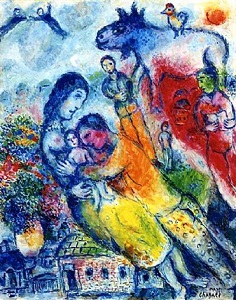
Marcelin Pleynet (Lyon, 23 december 1933)
La joie familiale door Marc Chagall, 1976
De Amerikaanse schrijver Norman Fitzroy Maclean werd geboren op 23 december 1902 in Clarinda, Iowa. Zie ook alle tags voor Norman Maclean op dit blog.
Uit: A River Runs Through It
“The fight seemed suddenly to stop itself. She was lying on the floor IletNN cell us. Then we but h began to cry and fight in a rage, each one shouting, “You son of bitch, you knocked my mother down.” She got off the floor, and, blind without her glasses, staggered in circles between us, saying without recognizing which one she was addressing, “No, it wasn’t you. I just slipped and fell.” So this was the only time we ever fought. Perhaps we always wondered which of us eras tougher, but, if boyhood questions aren’t answered before a certain point in time, they can’t ever be raised again. So we returned to being gracious to each other, as the wall sug-gested that we should be. We also felt that the woods and rivers were gracious to us when we walked together beside them. It is true that we didn’t often fish together anymore. We were both in our early thirties now, and “now” from here on is the summer of 1937. My ft tiler had retired and he and mother were living in Missoula, our old home town, and Paul was a reporter in Helena, the state capital. I had “gone off and got married,” to use my brother’s description of this event in my life. At the moment, I was living with my wife’s family in the little town of Wolf Creek, but, since Wolf Creek is only forty miles from Helena, we still saw each other from time to time, which meant, of course, fishing now and then together. In fact, the reason I had come to Helena now was to see him about fishing. The fact also is that my mother-in-law had asked me to. I wasn’t happy, but I was fairly sure my brother would finally say yes. He had never said plain no to me, and he loved my mother-in-law and my wife, whom he included in the si gn on the wall, even though he could never under-stand “what had come over me” that would explain why marriage had ever crossed my mind. I ran into him in front of the Montana Club, which was built by rich gold miners supposedly on the spot where gold was discovered in Last Chance Gulch.”
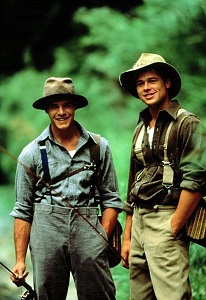
Norman Maclean (23 december 1902 – 2 augustus 1990)
Scene uit de film van Robert Redford uit 1992 met Craig Sheffer (Norman) en Brad Pitt (Paul)
De Engelse dichteres, schrijfster en vertaalster Sara Coleridge werd geboren op 23 december 1802 in Greta Hall, Keswick. Zie ook alle tags voor Sara Coleridge op dit blog.
The Boy That Would Rather Be Naughty Than Good (Fragment)
Young Ronald one day in a fury was roaring,
His passion still higher and higher was soaring;
Cried he, while the tears from his eyelids were pouring,
“I’d rather be naughty than good!”
To learn stupid lessons I’ll never engage,
I’ll storm, and I’ll bluster and riot and rage,
I ne’er will consent to be kept in a cage,
I will go and walk in the wood.”
His mother, astonished, cried “Ronald, for shame!
This terrible temper unless you can tame,
Such folly the rod must be called to reclaim,
And every one else will be ruffled.
Don’t stare with your eyes, and don’t wrinkle your brow,
Nor stamp and kick up such a dust and a row,
Nor shake your head angrily like the mad cow
Whose horns the old farmer has muffled.
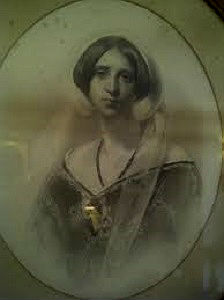
Sara Coleridge (23 december 1802 – 3 mei 1852)
De Nederlandse dichter-dominee Jan Jakob Lodewijk ten Kate werd geboren op 23 december 1819 in Den Haag. Zie ook alle tags voor J.J.L. ten Kate op dit blog.
Bloemkrans
voor de liefste
Wanneer, ook dán als de andre tekens zwijgen,
De ziel haar zucht in kleuren wedergeeft,
De Min haar blos in ’t rozenblad doet stijgen,
De Erinnring in ’t vergeet-mij-nietje beeft;
Als Hope fladdert in de groene twijgen,
De Rouw in ’t lover der cypresse zweeft;
Als Jaloezij de gele tulp doet hijgen,
De Glorie in de frissen lauwer leeft:
Dan diende ik U een bonte krans te schenken,
Waaruit ge U álle kleuren toe zag wenken
Op ’t levendig fluweel van blad en bloem:
Gij immers zijt mijn Liefde, mijn Herdenken,
Mijn Vreugde en Smart, mijn IJver en mijn Roem,
Die ik de mijne in dood en leven noem!
Werd de Liefde eens geknakt
Werd de Liefde eens geknakt in haar tedere knop,
Tot haar blaren verwelkten en vielen,
Geen genegenheids-zon wekt haar leven weer op,
Want maar eens bloeit de lente der zielen.
Is de Hope misleid, dan ontvlucht zij het hart,
En keert weer door beloften noch giften;
Maar de Erinnring blijft achter en leeft van de smart,
En broedt voort op de puinhoop der driften.
Men verhaalt, dat de zwaluw haar nestje ontwijkt,
Als de stormwind de gevel doet kraken;
Maar de nachtuil keert in tot het huis dat bezwijkt,
Waar ze bouwt in een klove der daken.
Sonnet op het Sonnet
Geverfde pop, met rinkelen omhangen,
Gebulte jonkvrouw in uw staal’ korset,
Lamzaligste aller vormen, stijf Sonnet!
Wat rijmziek mispunt deed u ’t licht erlangen?
Te klein om één goed denkbeeld op te vangen,
Voor epigram te groot en te koket,
Vooraf geknipt, koepletje voor koeplet,
Kroopt ge onverdiend in onze minnezangen.
Neen! de echte Muze eist vrijheid; en het Lied,
Onhoudbaar uit het zwoegend hart gerezen,
Zij als een bergstroom die zijn band ontschiet!
Gij deugt tot niets, tenzij het deugen hiet,
Om, enkel door de broddelaars geprezen,
Op Geysbeek een berijmd vervolg te wezen.
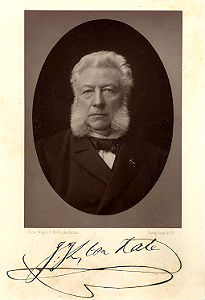
J.J.L. ten Kate (23 december 1819 – 24 december 1889)
De Italiaanse schrijver Giuseppe Tomasi di Lampedusa werd geboren in Palermo op 23 december 1896. Zie ook alle tags voor Giuseppe Tomasi di Lampedusa op dit blog.
Uit: The Leopard (Vertaald door Archibald Colquhoun)
“And the Sedira, all the various Sedira, from the petty one who violated arithmetic at Donnafugata to the major ones at Palermo and Turin, had they not committed a crime by choking such consciences? Don Fabrizio could not know it then, but a great deal of the slackness and acquiescence for which the people of the South were to be criticised during the next decade, was due to the stupid annulment of the first expression of liberty ever offered them. Don Ciccio had said his say. And now his genuine but rarely shown side of “austere man of principle” was taken over by one much more frequent and no less genuine, that of snob. For Tumeo belonged to the zoological species of “passive snob”, a species unjustly reviled nowadays. Of course the word “snob” was unknown in the Sicily of 186o; but just as tuberculosis existed before Koch, so in that remote era there were people for whom to obey, imitate and above all avoid distressing those whom they considered of higher social rank than themselves was the supreme law of life; snobbery, in fact, is the opposite of envy. At that time a man of this type went under various names; he was called “devoted”, “attached”, “faithful;” and life was happy for him since a nobleman’s most fugitive smile was enough to flood an entire day with sun; and accompanied by such affectionate appellatives, the restorative graces were more frequent than they are to-day. Now Don Ciccio’s frankly snobbish nature made him fear causing Don Fabrizio distress, and he searched diligently round for ways to disperse any frowns he might be causing on the Prince’s Olympian brow; the best means to hand was suggesting they should start shooting again; and so they did. Surprised in their afternoon naps some wretched woodcock and another rabbit fell under the marks-men’s fire, particularly accurate and pitiless that day as both Salina and Tumeo were identifying those innocent creatures with Don Calogero Sedira.”
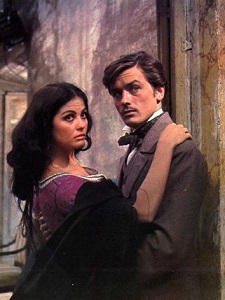
Giuseppe Tomasi di Lampedusa (23 december 1896 – 23 juli 1957)
Claudia Cardinale en Alain Delon in de gelijknamige film van Luchino Visconti, 1963
De Hongaarse schrijver Iván Mándy werd geboren op 23 december 1918 in Boedapest. Zie ook alle tags voor Iván Mándy op dit blog.
Uit: The Watermelon Eaters (Vertaald door Albert Tezla)
“And the Sedira, all the various Sedira, from the petty one who violated arithmetic at Donnafugata to the major ones at Palermo and Turin, had they not committed a crime by choking such consciences? Don Fabrizio could not know it then, but a great deal of the slackness and acquiescence for which the people of the South were to be criticised during the next decade, was due to the stupid annulment of the first expression of liberty ever offered them. Don Ciccio had said his say. And now his genuine but rarely shown side of “austere man of principle” was taken over by one much more frequent and no less genuine, that of snob. For Tumeo belonged to the zoological species of “passive snob”, a species unjustly reviled nowadays. Of course the word “snob” was unknown in the Sicily of 186o; but just as tuberculosis existed before Koch, so in that remote era there were people for whom to obey, imitate and above all avoid distressing those whom they considered of higher social rank than themselves was the supreme law of life; snobbery, in fact, is the opposite of envy. At that time a man of this type went under various names; he was called “devoted”, “attached”, “faithful;” and life was happy for him since a nobleman’s most fugitive smile was enough to flood an entire day with sun; and accompanied by such affectionate appellatives, the restorative graces were more frequent than they are to-day. Now Don Ciccio’s frankly snobbish nature made him fear causing Don Fabrizio distress, and he searched diligently round for ways to disperse any frowns he might be causing on the Prince’s Olympian brow; the best means to hand was suggesting they should start shooting again; and so they did. Surprised in their afternoon naps some wretched woodcock and another rabbit fell under the marks-men’s fire, particularly accurate and pitiless that day as both Salina and Tumeo were identifying those innocent creatures with Don Calogero Sedira.”
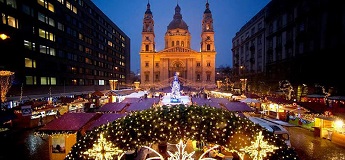
Iván Mándy (23 december 1918 – 26 oktober 1995)
Adventstijd in Boedapest
Zie voor nog meer schrijvers van de 23e december ook mijn vorige blog van vandaag.

